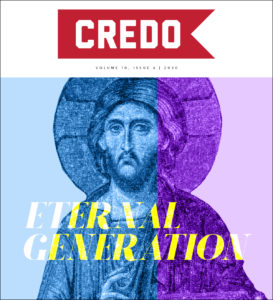In the fourth-century a famous debate was brewing, going back to at least Origen, and it came to a head with the Arian controversy.[1] The dispute centered on specifying the origin of Jesus Christ in the eternal life of God. Was the Son made, even if his making was prior to and unlike the other creatures (as Arius taught), or was he eternally begotten (as bishop Alexander taught)? The pathway paved through this conflict has been called pro-Nicene,[2] named from The Council of Nicaea (325). Nicaea formalized a pattern of biblical reasoning which authorized the doctrine of eternal generation as the orthodox way to speak of the Son’s perfect life.
The doctrine itself can be stated plainly: The Son is from the Father, and God has always been this way and did not become this way. We should take note that such a definition might threaten to elide the very divine ineffability it attempts to express. The patristic witness is replete with warnings here, so Gregory of Nazianzus, “The begetting of God must be honored by silence.”[3] Yet to draw back in this way is not to bring our theological reflection on God’s inner life to an end, rather it is to establish from the beginning spiritual disciplinary measures which guide how we are scripturally given to think and speak of the living God who dwells in unapproachable light (1 Tim. 6:16), comes as Light to enlighten (John 1:9), and of whom we thus confess that he is Light from Light. The doctrine of eternal generation therefore seeks, in faith and mystery, to confess that You, oh God, are “a fountain of life,” and that “in Your light we see light” (Ps 36:9).
How does eternal generation speak of this Light and Life? The doctrine’s dogmatic function in theology proper can be summarized under three themes: essential unity, personal distinction, and relational order (taxis).
Essential Unity
First, in what way does eternal generation speak of essential unity? Initially, it appears as though the confession of the Son as the only-begotten of the Father must strike against the doctrine of essential unity (divine simplicity). How can the one God be both Father and Son? The pro-Nicene answer can be seen by looking at the language of the two councils of Nicaea (325) and Constantinople (381). Both confess that the Son does not proceed from the Father as a creature from the Creator: he is begotten, not made. The Son is not part of the created order; begetting is not the first act of creation. However, neither council attempts to fully explain what it means to be begotten, respecting the ineffability of this act. Rather, they assert there is a way to be “from” that is outside all beginnings (recalling Jn. 1:1). This generation is conceived as an act internal to God[4], such that the Father generates the Son of his substance, ek tas ousias tou Patros (325), and as such the Son is consubstantial, homoousion (325 and 381), with the Father.
Two things should be noted concerning this strange language. On the one hand, the homoousion is not employed to indicate some detachable metaphysic; the language offers no objective referent on its own, instead it functions as a conceptual summary of Scripture’s affirmation of the Son’s unity with the Father grounded in his ineffable generation.[5]
On the other hand, this articulation of the Son’s generation is a denial that Begetter and Begotten are related as externally opposed realities. Instead, generation is the mode-of-sharing of the one undivided essence between Father and Son. As such, generation is conceived as a communication of the whole undivided essence, as Athanasius interprets with the language of “whole participation.”[6] The Nicene Creed (381) adds the corresponding clause that the Son is, “begotten of the Father before all ages”, specifying the timeless and eternal nature of the Son’s generation. Dogmatically, begetting is a mode of divine unity, an affirmation of essential unity rather than a denial of it.[7]
Personal Distinction
Second, in what way does eternal generation speak of personal distinction? To confess eternal generation is to deny that Jesus is Son of God by means of his miraculous virgin-birth, no less his baptism or resurrection – instead he is begotten of the Father before all ages. That this entails personal distinction seems rather straightforward, by analogy of creaturely generation, but confessing it is crucial for securing this reality as true in God (in se). The doctrine of eternal generation is the pro-Nicene pathway by which this confession is conceptually articulated. It asserts that Father and Son are eternally related by origin alone, Begetter and Begotten, not by essential difference (since they share the same undivided essence). It affirms both their complete unity in all things pertaining to deity, and their personal distinction in all things pertaining to their uniqueness as Father and Son, that is, with respect to one another.
In this way, eternal generation is attempting to follow the language of Scripture which affirms before the beginning the Word who is with God, as God (Jn 1:1), is none other than the only-begotten in the bosom of the Father (Jn 1:18). Dogmatically, begetting is the ground of personal distinction, an affirmation of the eternal uniqueness of Father and Son without severance of the divine essence. Eternal generation is attempting to follow the language of Scripture which affirms before the beginning the Word who is with God, as God (Jn 1:1), is none other than the only-begotten in the bosom of the Father (Jn 1:18). Click To Tweet
Relational Order
Finally, in what way does eternal generation speak of relational order (taxis)? The pro-Nicene tradition teaches that eternal generation speaks of a correlative relation between Father and Son; paternity and filiation are mutually specifying, yet they are relationally ordered and not flatly symmetrical. What does this mean? In more recent history debating the Son’s generation, some have confessed the eternal Sonship of Christ, yet denied that this implies taxis in the Godhead.
Others have confessed the obedience of the incarnate Son to his Father in the saving economy, and thereby inferred a certain form of taxis in the Godhead, specified by the language of authority-submission. In contrast to both, the doctrine of eternal generation teaches that the Father-Son relation is fundamentally ordered, asymmetrical, and yet by origin alone. Because the Father-Son relation is internal to God (homoousion) there can be no essence dividing over-against relation (e.g. authority-submission), instead only the relational order established by way of origin.[8] And because the Father truly and timelessly generates the Son no appeal to essential equality can undermine this relational order which is what we mean when we say Father, Son, and Spirit.
Perhaps it is here we realize most clearly that we are at the very edge of a mystery. Gratefully, we are not alone and other pro-Nicenes, like Thomas Aquinas, offer us help. Thomas affirms the Son is Son because he is begotten by the Father, and the Father is Father because he is from no one, and thus he begets his Son.[9] Dogmatically this order is established by an eternal relation of origin, and nothing else. In time, this eternal order of personal subsistence is manifest in the saving economy in the order and manner of the Son’s working from the Father. Thomas Aquinas expresses the relation between theology-economy by noting that the Son’s earthly mission contains and reveals his eternal procession. Yet importantly, he never collapses the two together. Click To Tweet
Thomas expresses the relation between theology-economy by noting that the Son’s earthly mission contains and reveals his eternal procession.[10] Yet importantly, he never collapses the two together nor “readings back” unfitting features of the created economy into the divine life. Dogmatically, begetting is the root of relational order, an affirmation that eternal personal subsistence describes the very taxis echoed in the saving economy.
Conclusion
Pro-Nicene theology teaches the eternal generation of the Son because by it the son of Mary is revealed to be the very Son of God. God is a fountain of life, and the church confesses this mystery to entail that the Father begets, the Son is begotten, and the Spirit proceeds. These eternal acts, concomitant with God’s own willing nature, are temporally manifest in love and grace in the missions of the Son and Spirit. Before all ages the Father has life in himself, and grants to the Son to have life in himself (John 5:26), and in creaturely time the Son gives life to whom he will (John 5:21). The wonder of the gospel is that the eternal Son, for whom and through whom are all things, has in these last days come from the Father to the far country to bring many sons to glory (Heb 2:10).
Endnotes
[1] Portions of this article appear in the book Retrieving Eternal Generation (Grand Rapids: Zondervan, 2017) and on the Zondervan blog Common Places (2016).
[2] Cf. Lewis Ayres, Nicaea and Its Legacy (Oxford: OUP, 2004) for a sketch of pro-Nicene theology as a theological culture.
[3] Gregory of Nazianzus, Third Theological Oration 29.8 (NPNF Series 2, 7:303).
[4] The description of generation as an internal act that is “within God himself” is seen most clearly in Aquinas ST 1.27.1 (against the Arians and Sabellians), but the concept appears as early as Origen, who claims the Son is not Son “by any outward act, but by his own nature,” First Principles 1.2.4 (ANF 4: 247).
[5] Khaled Anatolios, Retrieving Nicaea (Grand Rapids: Baker Academic, 2011), p. 128.
[6] Athanasius, Against the Arians 1.14 (NPNF Series 2, 4: 315).
[7] Historically there was a simmering debate about whether the manner of eternal generation is properly conceived as a communication of essence. The majority of patristic, medieval, and Reformation authors do affirm it as such. For an account of the minority report and incisive contribution to this debate see Brannon Ellis, Calvin, Classical Trinitarianism, and the Aseity of the Son (Oxford: Oxford University Press, 2012).
[8] Cf. Scott R. Swain and R. Michael Allen. “The Obedience of the Eternal Son,” International Journal of Systematic Theology 15, no. 2 (2013): 114-34.
[9] So Aquinas reasons, “Because he is Father, he begets (quia Pater est, generat),” and not the inverse proposition: Because he begets, he is Father. See Summa Theologiae 1a.40.4 ad 1.
[10] Aquinas on the relation of mission to procession, “Hence mission is only temporal. Or we may say that it includes the eternal procession, with the addition of a temporal effect.” See Summa Theologiae 1a.43.2 ad 3.



